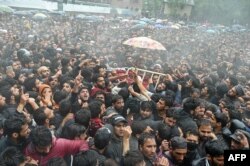Government forces in Indian-controlled Kashmir killed a top militant commander linked to al-Qaida in the disputed region, officials said Friday.
Zakir Musa was killed Thursday evening in a gunfight after police and soldiers launched a counterinsurgency operation in the southern Tral area, said Col. Rajesh Kalia, an Indian army spokesman.
Musa refused to surrender and fired grenades at the troops after they zeroed in on his hideout in a civilian home, police said.
His killing triggered violent anti-India protests in many places. No one was immediately reported injured.
Internet cut off
Authorities cut off internet on mobile phones in a common tactic to make organizing anti-India protests difficult and discourage dissemination of protest videos. They also imposed a curfew across much of the Kashmir Valley, including in the main city of Srinagar, in anticipation of more protests and clashes, and ordered schools and colleges to remain closed.
In mid-2017, an al-Qaida linked propaganda network said Musa joined an affiliate militant group, Ansar Ghawzat-ul-Hind, as its head. He had left Kashmir’s largest indigenous rebel group, Hizbul Mujahideen, and was believed to be joined by less than a dozen others.
Media sensation
He instantly became a media sensation, particularly with New Delhi-based television news channels using him to showcase that Kashmiri struggle for self-rule was part of a global militant agenda. Previously, no global jihadi groups have openly operated in Kashmir, a territory divided between India and Pakistan but claimed by both entirely.
All Kashmir rebel groups rejected Musa and his al-Qaida affiliate, some even calling him inimical to their cause.
Separatist leaders, who challenge India’s sovereignty over Kashmir, have repeatedly rejected the presence of outside groups, including al-Qaida, and have accused India of portraying the Kashmiri struggle as extremist.
Musa was a close aide of Burhan Wani, a charismatic Kashmiri rebel leader whose killing in 2016 triggered open defiance against Indian rule.
Wani’s death and the resulting public fury brought the armed rebellion into the mainstream in Kashmir and revived a militant movement that had withered in recent years to about 100 fighters in scattered rebel outfits.
Officials say since Wani’s killing, hundreds of young men have joined rebel ranks, some of them after stealing weapons from soldiers and police. Wani’s death also cemented a shift in public behavior, with people displaying anger at Indian rule openly and violently when troops raid villages to hunt rebels.
Rebel groups have been fighting against Indian rule since 1989. Nearly 70,000 people have been killed in the armed uprising and the ensuing Indian military crackdown.
Anti-India sentiment runs deep in Kashmir’s mostly Muslim population, with most people supporting the rebel cause that the territory be united either under Pakistani rule or as an independent country while also participating in civilian street protests against Indian control.





